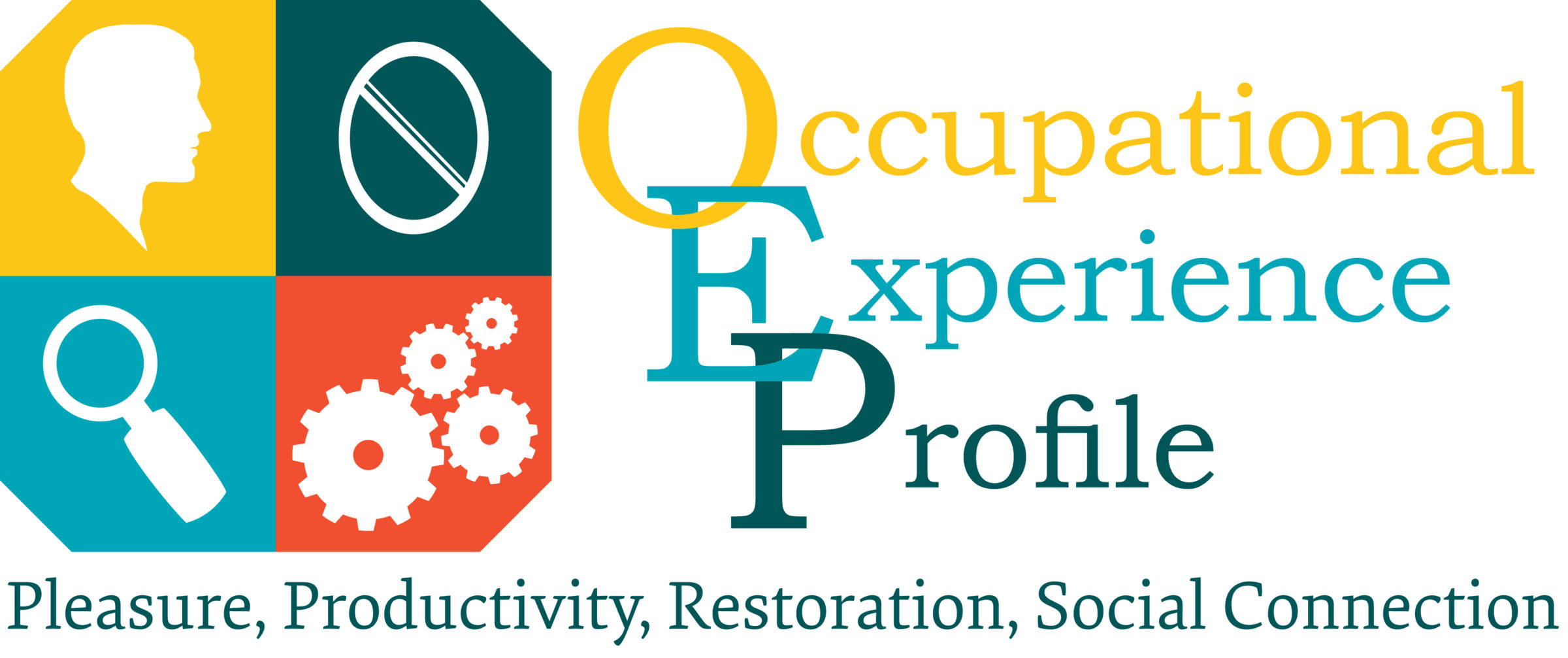The Occupational Experience Profile will no longer be hosted at CSU OT after June 2024. The OEP manual, paper assessment, and consultation will continue to be available through CSU-OT until the transition occurs. We will keep this page updated with information on the changes as they become available.
For more information contact oep@colostate.edu.

The Occupational Experience Profile, formerly the PPR Profile, is an occupation-focused assessment for use in a variety of settings.
The OEP is designed to help people:
- Become aware of what they do and experience in everyday life
- Reflect upon their experiences associated with their activities
- Discover what impacts how they feel about what they’re doing
- Think about how what they do and experience impacts their health and well-being
Occupational Experience Profile More Information
Purchase
The Occupational Experience Profile (OEP) is available for purchase by occupational therapy practitioners or occupational scientists. The assessment is available in a paper-pencil format at this time. Available materials include:
- OEP Kit includes a manual and 5 paper assessments: The downloadable manual provides foundational training.
- OEP paper assessments (pkg of 25)
- Consultation: Dr. Atler is available for consultation at an hourly rate when arranged in advance
TO ORDER:
All materials can be purchased using a credit card online at the OT Storefront.
To purchase using a purchase order (PO), please send the PO to the attention of Dr. Karen Atler at Colorado State University, Department of Occupational Therapy, Fort Collins CO 80523-1573.
Use
As a time-use diary, the OEP is designed to (1) capture what people do and experience in the context of their everyday lives, and (2) promote awareness of how experiences of pleasure (enjoyment/ non enjoyment, productivity (accomplishment/nonaccomplishment), restoration (energy renewal/energy drain) and social connectedness (connection/disconnection) relate to daily occupations. The OEP asks the user to record what they did over a 24-hour period of time. For each activity logged, the user records when they engaged, where and with whom along with their level of pleasure, productivity, restoration, and social connectedness.
The OEP can be used in education, practice, and research, and is available as a paper-pencil assessment. Occupational science and occupational therapy programs have used the OEP as an occupation-focused assessment to develop interview skills and as an experiential activity to promote knowledge of the occupation. The OEP has been used in a variety of practice settings including pain rehabilitation, acute and community mental health, unhoused transitioning, diabetes education, and eating disorders.
Results of the OEP support goal and strategy development to promote change in occupations as a means towards enhancing health and well-being.
Unique Features
- Honors/privileges the insider perspective
- Supports examination of the inter-relationships among various objective and subjective dimensions of occupation
- Enables discussion about the personal meanings associated with occupation and the various factors that influence meaning
- Allows for different administration methods
Publications
Atler, K. E. & Krishnagiri, S. (2023). College students’ adaptations of activities and experiences during the pandemic occupational disruption. OTJR: Occupation, Participation and Health. 44(2):296-305. doi: 10.1177/15394492231216353
Rider, J.V. & Tay, M.C. (2022). Increasing occupational engagement by addressing psychosocial and occupational factors of chronic pain: A case report. The Open Journal of Occupational Therapy, 10 (3), 1-12. . https://doi.org/10.15453/2168-6408.2027
Breen-Franklin, A., & Atler, K. (2022). Use of the Subject-centered Integrated Learning Model and the Occupational Experience Profile to promote students’ connections among occupation self, and the profession. Journal of Occupational Therapy Education, 6(1). https://doi.org/10.26681/jote.2022.060117
Atler, K.E., & Fisher, A.G. (2022). Validity and reliability of the Occupational Experience Profile. Scandinavian Journal of Occupational Therapy. doi: 10.1080/11038128.2022.2027009
Bailliard, A., Schafer, Z., & Hart, L. (2021). Occupational reflection as intervention in inpatient psychiatry. American Journal of Occupational Therapy, 75 (5), 1-8. https://doi.org/10.5014/ajot.2021.043703
Atler, K.E., & Fox, A.L. (2020). Mental health consumers’ perspectives on using an occupation-focused assessment to initiate change in everyday activities. British Journal of Occupational Therapy, 1-10. DOI: 10.1177/030802620954340
Watford, P., Jewell, V., & Atler, K. (2019). Increasing meaningful occupation for women who provide care for their spouse. A pilot study. OTJR: Occupation, Participation and Health. 1-9. DOI: 10.1177/1539449219829849.
Atler, K (2015). An Argument for a Dynamic Interrelated View of Occupational Experience. Journal of Occupational Science, 22:3, 249-259. DOI: 10.1080/14427591.2014.887991.
Atler, K., Eakman, E. & Orsi, B. (2015). Enhancing construct validity evidence of the Daily Experiences of Pleasure, Productivity, and Restoration Profile. Journal of Occupational Science. DOI: 10.1080/14427591.2015.1080625.
Atler, K. (2015). User-perceived utility of the Daily Experiences of Pleasure, Productivity, and Restoration Profile. Canadian Journal of Occupational Therapy, Vol. 82(4) 235-244. DOI: 10.1177/0008417415571731.
Atler, K., Barney, L., Moravec, A., Sample, P. and Fruhauf, C. (2017). The Daily Experiences of Pleasure, Productivity, and Restoration Profile: A case study. Canadian Journal of Occupational Therapy, Vol. 84(4-5) 262-272. DOI: 10.1177/0008417417723119.
Atler, K., Eakman, A. and Orsi, R. (2018). College students’ experiences of hedonia and eudaimonia in their everyday activities. Canadian Journal of Occupational Therapy, Vol. 85(1) 66-78. DOI: 10.1177/0008417417727297.
Contact
The OEP was developed by Karen Atler, Ph.D., OTR/L, FAOTA, Professor Emerita, Department of Occupational Therapy at Colorado State University. Any questions related to the OEP can be directed to oep@colostate.edu.



